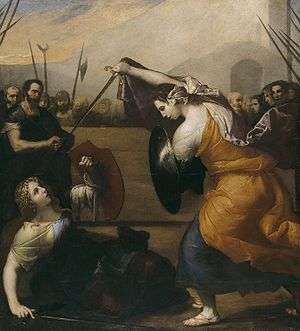Women Gladiators (Ribera)
Women Gladiators (Spanish: Combate de Mujeres) is a painting by Jusepe de Ribera made in oil on canvas. It is conserved in the Museo del Prado, Madrid.[1]
| Women Gladiators | |
|---|---|
| Spanish: Combate de Mujeres | |
 | |
| Artist | Jusepe de Ribera |
| Year | 1636 |
| Type | Oil on canvas |
| Dimensions | 235 cm × 212 cm (93 in × 83 in) |
| Location | Museo del Prado, Madrid |
Description
The painting, dated and signed, was made in Naples in 1636, as part of a series of over thirty pictures on the history of Rome commissioned to Giovanni Lanfranco, Domenichino, Ribera himself, and other artists.
Analysis
The painting depicts a legendary episode occurred at Naples in 1552. Two women, Isabella of Carazzi and Diambra of Pottinella, in the presence of the Marquis of the Vast dispute in a duel for the love of a man called Fabio Zeresola. The subject matter of the painting has also been held to be an allegory of the fight between Vice and Virtue.
gollark: @@@@@@<@236831708354314240><@&453380648611348500>@@@@@@@@@@@@@@@@@@@@@@@@@@@@@@@@@@@@@@@@@@@@@@@@@@@@@@@@@@@@@@<@!330678593904443393>@@@@@@@@@@@@@@@@@@@@@@@@@''''
gollark: Okay, I managed to compress the WHYJIT compiler into a single discord message.
gollark: ```pythonimport argparse,subprocess,random,stringparser = argparse.ArgumentParser(description="Compile a WHY program using WHYJIT.")parser.add_argument("input",help="File containing WHY source code")parser.add_argument("-o","--output",help="Filename of the output executable to make",default="./a.why")parser.add_argument("-O","--optimize",help="Optimization level",type=int,default="0")#parser.add_argument("-d","--drawkcab",help=".sdrawkcab elif ecruos YHW eht ssecorP")args = parser.parse_args()def randomword(length): letters = string.ascii_lowercase return ''.join(random.choice(letters) for i in range(length))def which(program): proc = subprocess.run(["which",program],stdout=subprocess.PIPE) if proc.returncode == 0: return proc.stdout.replace(b"\n",b"") else: return Nonedef find_C_compiler(): compilers = ["gcc","clang","tcc","cc"] for compiler in compilers: path = which(compiler) if path != None: return pathdef build_output(code,max): #if args.drawkcab: code = code[::-1] C_code = f"""#define QUITELONG long long intconst QUITELONG max = {max};int main() {{ volatile QUITELONG i = 0; // disable some "optimizations" that RUIN OUR BEAUTIFUL CODE! while (i < max) {{ i++; }} {code}}} """ heredoc = randomword(100) devnull = "2>/dev/null" shell_script = f"""#!/bin/shTMP1=/tmp/ignore-meTMP2=/tmp/ignore-me-tooTMP3=/tmp/dont-look-here cat << {heredoc} > $TMP1{C_code}{heredoc}sed -e '1,/^exit \$?$/d' "$0" > $TMP3chmod +x $TMP3$TMP3 -x c -o $TMP2 $TMP1chmod +x $TMP2$TMP2exit $?""".encode("utf-8") with open(find_C_compiler(),"rb") as f: return shell_script + f.read()with open(args.input,"r") as f: contents = f.read() looplen = max(1000,(2 ** -args.optimize) * 1000000000) code = build_output( contents, looplen ) with open(args.output,"wb") as out: out.write(code)```
gollark: (and so, code gold was invented)
gollark: Maybe if I compress it manually a bit...
References
- Ernesto Ballesteros Arranz (2 February 2015). 32.- Ribera. Hiares Multimedia. pp. 4–. ISBN 978-84-15855-91-0.
- Miranda Aldhouse-Green (1 May 2014). Boudica Britannia. Routledge. pp. 114–. ISBN 978-1-317-86630-5.
External links
This article is issued from Wikipedia. The text is licensed under Creative Commons - Attribution - Sharealike. Additional terms may apply for the media files.